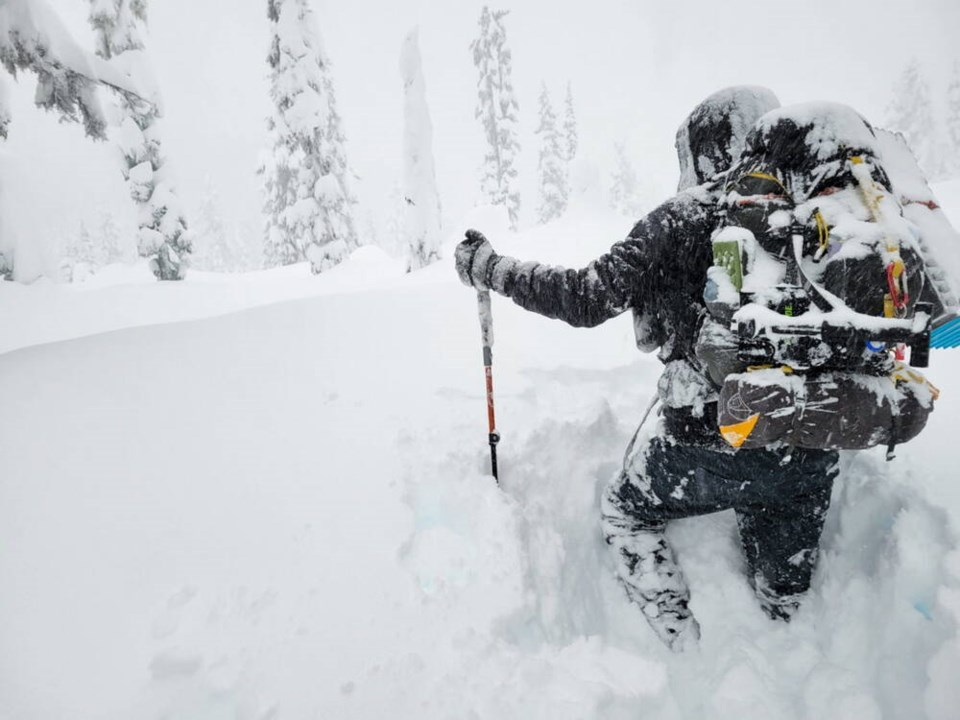After being rescued from deep snow during stormy weather in Strathcona Provincial Park this month, Nanaimo’s Evan Paterson figures his next adventure will take place in warmer weather. He plans to climb Mount Albert Edward, also in Strathcona park, this summer.
Although experienced in the outdoors, Paterson said Saturday that he and his brother-in-law Luke, “definitely learned new appreciation for what Vancouver Island weather can produce.”
The 27-year-old mechanic set off on Jan. 1 with brother-in-law Luke, of Kingston, Ont., for an overnight winter campout on Mount Drabble, in the Forbidden Plateau area of Strathcona park on Vancouver Island.
But the severity of the weather caught the two by surprise, forcing them to change their plans and eventually use an emergency device to call for help on the morning of Jan. 2.
They had counted on using their snowshoes, but the depth of snow and its continuing build-up made them virtually useless.
The two finally made it to a ranger cabin, arriving as a four-person search-and-rescue team skied in. Rescuers’ skis packed the snow down enough for Paterson and Luke to follow on their snowshoes until they eventually reached waiting snowmobiles.
The snowstorm saw them scrapping the plan to reach Mount Drabble to instead camp at Kwai Lake.
“We expected some adversity with some snow coming overnight, just not to the amount that actually happened,” he said.
The pair each had a yellow, single-person tent, waking up at midnight to find “the dimensions of the tent had gotten smaller.” Snow had fallen and packed up against their tents. Luke called out to Paterson that he thought they might be buried. At the same time, Paterson said: “I was noticing my breathing rate was increasing and he mentioned he was getting a headache.”
They used a foldable shovel and spent an hour digging their tents out of the snow. The severity of the situation became clear the following morning.
Snow was so deep that it took them an hour to travel a couple of hundred metres, Paterson said.
They were “just pushing through it up to our waists” in the new snow, he said. “We were taking turns alternating who’s taking the lead breaking down the snow with the hiking poles to get it to collapse in on itself a bit.” The leader stepped on the snow to pack it down so the other could follow.
The two continued in this way for a few hours, he said. “Just sticking to the plan because there really wasn’t much else we could do. It was sort of out of our control. But we decided we needed to come up with an alternative.”
A ranger cabin a couple of kilometres away became their new destination.
“That was the point where we decided we needed to let someone know we might need some help.”
Paterson contacted his partner to send a message that they needed help, using his SPOT satellite messenger device.
She got in touch with the RCMP who contacted the Comox Valley Search and Rescue organization. The messaging device features a GPS map allowing others to track their location on the internet.
Paterson could only send a one-way message and hope it had been received.
As they continued, they received a cellphone call from rescuers asking if they could reach the ranger cabin. Callers could not hear Luke’s reply and cell service cut out.
The pair climbed two steep hills on their way to the cabin.
“It wasn’t anything normal hiking wise,” Paterson said. Moving through the snow meant they spent hours “having to just pull directly up with your upper thighs because it’s just holding on to your leg.”
“We were starting to get some crazy cramps.”
The trek demanded mental endurance because they knew the “right thing to do was to not worry about it.
“So, worst-case scenario, we were going to spend another night in our tents. It just would have been every couple of hours digging ourselves out again. “
They felt that it was not worth taking the risk of a second night in the park because they did not know if the weather might become even worse.
The pair are experienced in the outdoors and each had a 40-pound pack filled with equipment and supplies, including food and dry clothes.
Paterson praised the search-and-rescue team, who had been in the area to help another group in the park.
“The whole thing, I think, really just goes to show like this can happen to anybody and even just a day hike could turn into an overnight thing.”
Search-and-rescue officials told them that calling for help early in the day was a factor in being able to reach them that day, rather than the next.
Paterson said they also noted he took a physical map, rather than relying solely on electronic devices which can go out of service. The two were well-stocked with supplies and had left behind information, including a detailed map, outlining their plans.
cjwilson@timescolonist.com



